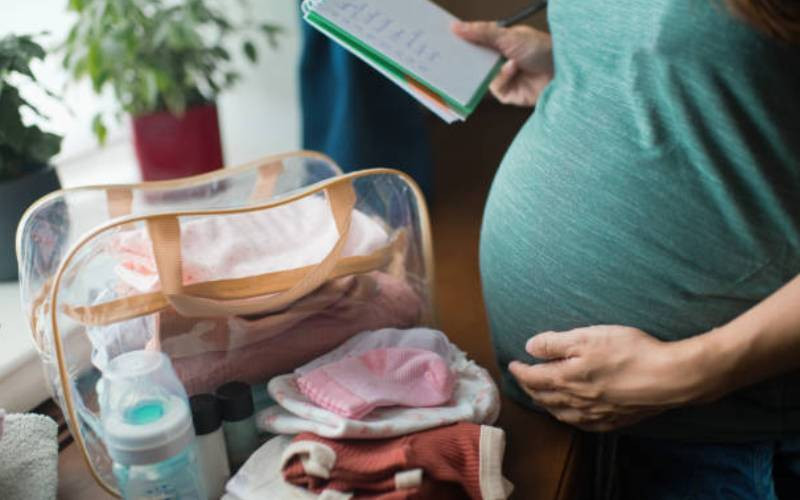
The lack of her baby's movement and Louise's small bump was indicative of fetal growth restriction - a very serious problem
Being delivered of a healthy baby is perhaps the foremost wish any parent-to-be has for their unborn child.
Louise Sapsford, 31, was no different when she was pregnant with her son, Sebastian. Yet given the heartache around his birth, and how it nearly resulted in tragedy, she admits:
"I thank my lucky stars every day that my son is here and he is healthy and happy."
Apart from a lot of morning sickness, up until the 33-week mark, Louise had a fairly normal pregnancy.
Up until that stage of her pregnancy, the mum from Wickford, Essex, had never come across the term ' fetal growth restriction '.
Two years later, owing to the ordeal she went through in the latter stage of her pregnancy, she is determined to raise awareness of the risk fetal growth restriction poses.
Sebastian was born on 30 January 2013 weighing a tiny 4lb 10oz.
He had put on just 7oz in the last seven weeks of the pregnancy, which Louise points out, "is the time when he should have put on the most weight."
Recalling the frightening moment she was told her baby was not developing as he should be, Louise says:
"The consultant measured my bump the day I saw her at 33 weeks and asked if I was sure I was 33 weeks, to which I replied 'yes'.
"She looked back through my notes, said I was measuring small and sent me for a growth scan before I left the hospital.
"I was advised at that point my son was weighing around 4lb 3oz and was on the small side.
"I'm not sure at that point if she actually mentioned the words 'fetal growth restriction', I just remember her saying if my son was growing as he should, I would be induced at 37 weeks.
"It was like one minute everything was OK and within the space of an hour she was saying he might not be growing as he should."
Anxious and frightened, Louise had questions and sought reassurance. She was told the appropriate notes had been made for the community midwife to see at her 36 week appointment.
The consultant added if Louise hadn't grown in size by that point, she should be sent for another growth scan, and then be booked in to be induced.
Unfortunately, there was no noticeable development, and Louise continues: "At 36 weeks my bump had not really grown. You should measure in centimetres to how many weeks pregnant you are.
"The community midwife told me that I had always measured small and she was not concerned."
Louise had another appointment with the midwife at 38.
Again, her bump had not grown, and she was told, again, "not to worry" as the baby was due in two weeks.
It is a point she now wishes she had gone with her instinct on.
Louise continues: "I did raise this with the midwife but to be honest, I had no idea just how dangerous it could be and this being my first pregnancy, I put my faith in her."
From 33 weeks, Louise had also noticed a lack of movement with her baby, but the results from a monitor showed all was well and there was a strong heartbeat.
"I was also told several times there would be less movement as baby got bigger as there was less room to move.
"This, I have since found out, is a total myth."
Four days before her due date, Louise went into labour. Although she was only two centimetres dilated, the size of her baby gave everyone cause for concern and she was classed as 'high risk' and kept in.
"That's when the tears came, I knew something awful was happening but everyone kept reassuring me everything would be OK."
"My son's heartbeat then started dropping with every contraction and they prepped me for a caesarean.
"Just as they put the canula in, I said I had to push. I was fully dilated so they agreed to let me push, at 4.38am, my son was born."
To Louise's distress, her partner was not allowed to cut the cord, and she only held him for a matter of seconds before he was whisked away from her.
"My mum was with me, and she started crying after seeing him.
"I was looking at my son and remember repeating, he's so small, why is he so small?"
More or less straightaway, the hospital explained how the placenta was quite scrawny and had stopped working, meaning her son had not been getting any vital nutrients in those final weeks.
In spite of the fact she had taken care of herself during pregnancy, Louise blamed herself:
"I kept asking what I done wrong, could I had done something different?"
To add to her sadness, her baby was too small and lacking in energy to breastfeed.
"Babies usually lose a bit of weight in the first few days, but the midwives kept telling me that Sebastian could not afford to do that."
To Louise's joy and relief, once they were able to take her son home, he started to thrive, and there were no further health complications.
Her experience, however, has had a lasting impact, and she not only sees how it could have ended in tragedy, but how information about fetal growth restriction needs to made more widely available.
 The Standard Group Plc is a multi-media organization with investments in media platforms spanning newspaper print
operations, television, radio broadcasting, digital and online services. The Standard Group is recognized as a
leading multi-media house in Kenya with a key influence in matters of national and international interest.
The Standard Group Plc is a multi-media organization with investments in media platforms spanning newspaper print
operations, television, radio broadcasting, digital and online services. The Standard Group is recognized as a
leading multi-media house in Kenya with a key influence in matters of national and international interest.






